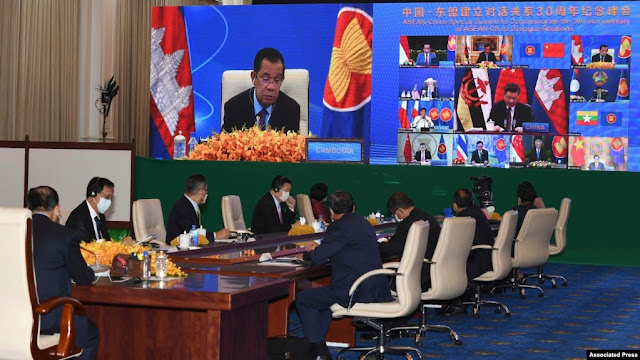China Says It Will Shun Hegemony in Disputed Asian Sea
pada tanggal
Nov 25, 2021
Edit
WASHINGTON, LELEMUKU.COM - Beijing's pledge this week to avoid dominance in the South China Seacomes too late to convince smaller Southeast Asian claimants to the strategic waterway after years of Chinese expansion, experts say.
President Xi Jinpingmade the pledge Monday at a virtual summit marking the 30th anniversary of ASEAN-China dialogue. Hetold leaders of the 10-member Association of Southeast Asian Nationsthat Beijing would avoid"bullying"smaller countries over their competing claims to the 3.5 million-square-kilometer sea.
China's representation at ASEAN events typically falls to Premier Li Keqiang, but this time,Xiaddressed the Southeast Asian countries and said"China will never seek hegemony, still less bully smaller countries,"according to a Tuesday report by Beijing's state-run China Daily website.
China vies with Brunei, Malaysia, the Philippines, Taiwan and Vietnam for sovereignty over parts of the resource-rich sea, which stretches from Hong Kong to Borneo. The Chinese government hasconductedlandfilling of tiny islets in the sea, in some cases for military use, alarming the other countries.
The Chinese navy, coast guard as well as its fishing fleets often antagonize other claimants, all militarily weaker than China, by passing through the disputed maritime tracts prized for fisheries and subterranean fossil fuel reserves.
Southeast Asia reaction
Xi's comments have been metwithskepticism among ASEAN member states because Southeast Asian leaders have heard similar language before, saidJayBatongbacal, international maritime affairs professor at the University of the Philippines in Quezon City.
Brunei, Malaysia, the Philippines and Vietnam are members of ASEAN, which negotiates as a bloc over external trade and security matters, including South China Sea conduct.
"The rest of the region, of course, won't take it at face value," Batongbacalsaid, referring especially to Southeast Asia."It's the actions of China that raise these concerns, even though China has been giving that kind of assurance even before."
China has no intention of quitting its positions in the sea, said AlexanderVuving, professor at the Daniel K. Inouye Asia-Pacific Center for Security Studies, in Hawaii. Xi had told former U.S. President Barack Obama in 2015thatChina would not militarize the sea but did anyway,Vuvingsaid.
Vietnam would not trust China's latest comments, he said, while the Philippines and Indonesia will find it suspicious. Indonesia does not vie with China over islets, but the two sides have disagreed over sea lanes.
Vietnam has sparred with China over disputed islands since the 1970s, leading to deadly clashes in 1974 and 1988. Malaysia and the Philippines have spoken out over the past year.
Earlier this month, Chinese coast guard vessels blocked Philippine resupply boats bound for Second Thomas Shoal, a Philippine-occupied atoll, and fired water cannons.
"We abhor the recent event in theAyunginShoal and view with grave concern other similar developments,"Duterte said Monday during his virtual participation in the ASEAN summit."This does not speak well of the relations between our nations and our partnership."
"The problem is that message [from China] becomes more laughable to a lot of its neighbors with every passing year,"said Gregory Poling, director of the Asia Maritime Transparency Initiative under the Washington, D.C.-based Center for Strategic and International Studies.
"You look at the South China Sea, Taiwan Strait, the border with India,"Poling said, referring to potential military flash points involving Beijing."It's getting harder for the ASEAN members who aren't involved in the disputes to still believe this Chinese line."
Why Xi spoke out
Regional experts like EduardoAraral, associate professor at the National University of Singapore's public policy school, say that having Xi take the unusual step of personally addressing the fraught issue of hegemony in the South China Sea before ASEAN member states was"the logical thing to do"for a burgeoning global power.
"When you're a small country and you border with a big country, you get nervous when that big country grows very big, so I guess for the past 30 years, this is the utmost question on the minds of leaders of ASEAN,"Araralsaid. China has the world's third strongest armed forces after the United States and Russia.
"So, when [fellow ASEAN leaders] have this opportunity to meet with President Xi Jinping, they probably expect him to make those assurances,"he said.
Vuvingof the Asia-Pacific Center for Security Studies, however, said Xi may have made his hegemony comment in case Southeast Asian governments are wondering whether Xi's recent meeting with U.S. President Joe Biden — or the AUKUS military technology sharing deal — could have altered China's geopolitical posture in the region.
AUKUS, a security deal between the United States, Britain and Australia designed to contain China's expansion, is opposed by Beijing.
Between the AUKUS rollout and last week's China -U.S. virtual bilateral,Vuvingspeculated that the Chinese may have"felt that they need to reassure their Southeast Asian neighbors a little bit."
While China is expected to"spread its sphere of influence"throughout the region without risking trade through any blockage of sea lanes,Araralsaid, Beijing might also try to displace the influence of Washington, which maintains a regular naval presence and sells arms in the region.
Multiple U.S.administrationshave declared their support for a"free and open Indo-Pacific,"which views"Beijing's claims to offshore resources across most of the South China Sea [as] completely unlawful, as is its campaign of bullying to control them."
ASEAN members without South China Sea claims are Cambodia, Laos, Myanmar, Singapore and Thailand. (Ralph Jennings |VOA)


